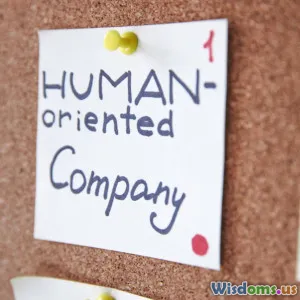
Data Reveals What Millennials Value Most at Work
8 min read Data uncovers millennials' workplace priorities, revealing what truly matters in job satisfaction and engagement today. (0 Reviews)
Data Reveals What Millennials Value Most at Work
Millennials, often dubbed the "digital natives," represent a significant portion of today’s workforce. Born approximately between 1981 and 1996, this generation has disrupted conventional workplace expectations and prioritized a new set of values. But what exactly do millennials value most at work?
Relying on diverse data sources — from global surveys to industry research — this article delves deep into understanding millennials’ workplace motivations, aspirations, and dealbreakers. We move beyond stereotypes and generalizations to uncover detailed insights that can inform employers, HR professionals, and even millennials themselves.
Millennials in the Modern Workforce: Setting the Context
As of 2023, millennials make up over 35% of the global workforce, a growing demographic influential in shaping workplace culture and policies. Unlike prior generations, millennials often prioritize elements beyond just salary:
- According to Deloitte’s Global Millennial Survey 2023, 86% of millennials say a sense of purpose in their work positively impacts their engagement.
- Gallup reports nearly 40% of millennials have switched jobs within a year, often in pursuit of better alignment with personal values and development opportunities.
These trends emphasize the changing dynamics between employers and employees, highlighting the need to understand what drives and motivates this generation.
1. Meaning and Purpose: Work That Resonates
One of the standout findings of recent studies is the overpowering desire for meaningful work.
What Does Meaningful Work Mean to Millennials?
For millennials, job satisfaction depends greatly on alignment with organizational values and social impact. They prefer roles that let them contribute to a mission bigger than profit.
Example: Patagonia, the outdoor apparel brand, appeals deeply to millennials through its environmental activism. Its employees frequently cite the company’s ethical stance as a primary reason for their commitment.
The Numbers Speak
- IBM's 2022 report found about 79% of millennials indicated they would stay at a company longer if it demonstrated a positive impact on society.
- “Purpose-driven companies outperform the stock market by 5% to 7% annually,” states Harvard Business Review, linking millennials’ preference to actual business results.
Real-World Insight
LinkedIn data reveals millennials are increasingly drawn to “impact-driven jobs,” with roles in sustainability, social enterprises, and nonprofit sectors growing faster than traditional corporate positions.
2. Work-Life Balance and Flexibility: The New Norm
Unlike generations before them, millennials put considerable emphasis on flexible working arrangements.
The Rise of Remote Work and Flex Hours
Emerging data from a 2023 Pew Research study shows 72% of millennials favor jobs offering flexible schedules or remote work. This shift was turbocharged by the COVID-19 pandemic but has maintained momentum.
Why Flexibility Matters
- It fosters better mental health, avoiding the burnout epidemic.
- Allows for caregiving responsibilities and family priorities.
Example: Dell Technologies reports a millennial turnover rate decrease by 13% after implementing flexible remote work policies.
Supporting Data
A 2023 Gallup poll highlights:
- Flexible hours are rated as more valuable than salary increases by 54% of millennials.
- Millennials with flexible jobs reported engagement scores 20% higher than those without.
3. Career Development: Growth Over Stability
Where past generations prized job stability, millennials focus on the opportunity to learn and grow as a core work value.
Continuous Learning and Advancement
Millennials evaluate employers based on access to training, mentorship, and clear career paths.
Data Point: LinkedIn’s 2023 Workforce Learning Report found that 74% of millennials stated learning new skills affected their decision to accept a role.
The Desire for Feedback and Recognition
Frequent and constructive feedback helps millennials align their personal goals with company objectives. Studies show that millennials who receive regular performance feedback are three times more likely to stay longer in their jobs.
Case Study
At Google, internal surveys note millennials are among the most engaged groups, attributing it to its culture of continuous feedback and learning opportunities.
4. Inclusion and Diversity: Essential Workplace Pillars
Millennials generally expect workplaces to embrace diversity and promote inclusion.
Data-Driven Priorities
- A 2023 McKinsey report reveals companies in the top quartile for ethnic and cultural diversity outperform less diverse competitors by 35% in financial returns.
- Approximately 71% of millennials consider a company's diversity efforts when deciding where to work, according to Glassdoor.
Inclusive Leadership
Millennials prefer leaders who are transparent, empathetic, and culturally competent.
Example: Salesforce is repeatedly recognized for its diversity initiatives which resonates strongly with millennial recruits and aids retention.
5. Compensation and Benefits: More Than Just Money
While competitive pay remains important, millennials often view compensation holistically — including benefits, wellness programs, and experiences.
Priorities in Compensation Packages
- Healthcare coverage, student loan assistance, and wellness resources rank highly.
- Companies offering mental health benefits see millennial retention rates increase by up to 25%.
Real-World Move: Starbucks’ student tuition reimbursement program is cited as a huge draw among millennials, helping the company maintain a strong young workforce.
Conclusion: Embracing Millennials’ Work Values Benefits All
Millennials are not merely looking for jobs—they seek meaning, flexibility, growth, inclusion, and well-being in their careers. Organizations recognizing and adapting to these values see:
- Increased engagement and productivity
- Lower turnover rates
- Enhanced reputation among talent pools
Employers should craft cultures that emphasize purpose-driven work, flexible practices, development opportunities, and diversity, backed by competitive, flexible benefits.
For millennials, understanding these workplace dynamics empowers better career decisions and fosters a fulfilling professional life.
As workplace dynamics continue to evolve, data-driven insights into millennial values will remain critical for building effective, sustainable, and resilient organizations.
References:
- Deloitte Global Millennial Survey 2023
- Gallup: State of the Global Workplace Report 2023
- IBM Corporate Social Responsibility Report, 2022
- Harvard Business Review: Purpose-Driven Companies
- LinkedIn Workforce Report 2023
- Pew Research Center, Remote Work Study 2023
- McKinsey & Company Diversity Report 2023
- Glassdoor Diversity Insights 2023
- Google Employee Engagement Study
- Salesforce Equality Data Report
- Starbucks Career and Benefits Policy
Rate the Post
User Reviews
Popular Posts



















